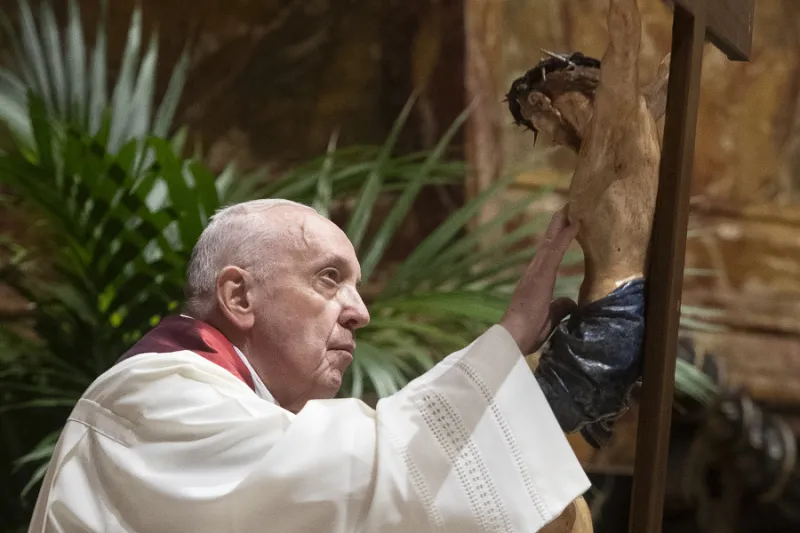
Vatican City, Sep 21, 2021 / 04:10 am (CNA).
Pope Francis urged theologians gathering in Rome on Tuesday to promote “a renewed understanding of contemporary challenges in light of the Wisdom of the Cross.”
In a message to participants in an international theological congress, the pope said he hoped that the meeting would contribute to the evangelization of the 21st-century world.
He said: “It is my hope that by promoting fruitful theological, cultural, and pastoral interactions, this initiative will contribute to a renewed understanding of contemporary challenges in light of the Wisdom of the Cross, in order to foster evangelization faithful to God’s design and attentive to humanity.”
The pope’s message, dated July 1 but released Sept. 21, was addressed to Fr. Joachim Rego, C.P., superior general of the Congregation of the Passion of Jesus Christ (Passionists).
The congress, dedicated to “The Wisdom of the Cross in a Pluralistic World” and taking place at the Pontifical Lateran University on Sept. 21-24, is part of a Jubilee year marking the 300th anniversary of the founding of the Passionist order.
“Contemplating the Crucified One, we see every human dimension embraced by God’s mercy. His kenotic [self-emptying] and compassionate love touches, through the Cross, the four cardinal points and reaches the extremes of our human condition, joining in a mysterious way the vertical relationship with God and the horizontal relationship with humanity, in a fraternal union that the death of Jesus has definitively made universal,” the pope said.
“The immense saving power unleashed by the weakness of the Cross reveals to theology the importance of an approach that knows how to combine the loftiness of reason with the humility of the heart.”
“Before the Crucified One, theology is also invited to address the most fragile and concrete conditions of men and women and to set aside polemical methods and agendas, joyfully sharing the labor of study, and confidently seeking the precious seeds that the Word scatters amidst the jagged and sometimes contradictory plurality of cultures.”
He continued: “The Cross of the Lord, a source of salvation for people of every place and every time, is therefore vibrant and effective also and above all at a crossroads, such as the contemporary one, characterized by rapid and complex changes.”
The pope sent a message to the Passionists in November 2020 as they prepared to launch the Jubilee year celebrating the foundation of the order by St. Paul of the Cross in Italy in 1720.
The Jubilee year, whose theme is “Renewing our mission: gratitude prophecy, and hope,” began on Nov. 22, 2020, and will end on Jan. 1, 2022.
“Do not tire of accentuating your commitment to the needs of humanity,” the pope said in his message to the order, dated Oct. 15.
“This missionary calling is directed above all towards the crucified of our age — the poor, the weak, the oppressed, and those discarded by many forms of injustice.”
Addressing participants in the four-day theological congress, the pope said that the gathering corresponded to the desire of St. Paul of the Cross “to ensure that the Paschal Mystery, the center of the Christian faith and the charism of the Passionist religious family, is proclaimed and disseminated in response to divine Charity, and that it addresses the expectations and hopes of the world.”
If you value the news and views Catholic World Report provides, please consider donating to support our efforts. Your contribution will help us continue to make CWR available to all readers worldwide for free, without a subscription. Thank you for your generosity!
Click here for more information on donating to CWR. Click here to sign up for our newsletter.





In his conclusion:
“the pope said that the gathering corresponded to the desire of St. Paul of the Cross ‘to ensure that the Paschal Mystery, the center of the Christian faith and the charism of the Passionist religious family, is proclaimed and disseminated in response to divine Charity, and that it addresses the expectations and hopes of the world.’”
In earlier support, and in regard to the “expectation and hopes of the world [and the] fraternal union that the death of Jesus has definitively made universal [“amidst the jagged and sometimes contradictory plurality of cultures”]:
“At the root of the great religions is the transcendent movement of man in search of God. Purified of its deviations and disagreeable aspects [yes], this movement should be the object of sincere respect. It is on this that the Christian faith comes to engraft itself. What distinguishes the Christian faith is that it is free adherence to the proposition of the gratuitous love of God which has been revealed to us, which has given us his only Son to free us from sin and has poured out his Spirit in our hearts. The radical reality of Christianity lies in the gift that God makes of himself to humanity, facing all the aspirations, requests, conquests and achievements of nature” (International Theological Commission, “Faith and Inculturation,” The Holy See, 1988).